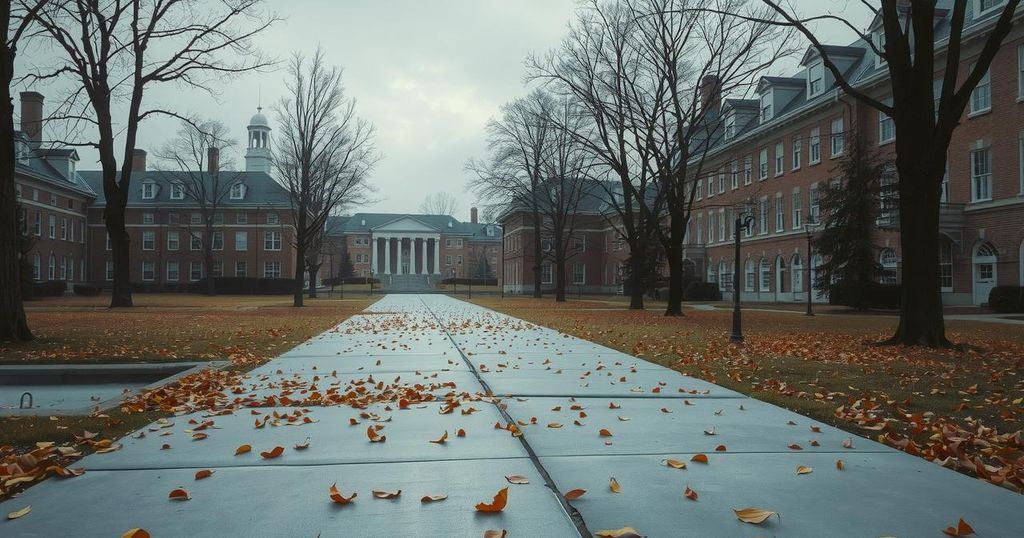Targeting Student Activism: Trump’s Revocation of Foreign-Born Visas

The Trump administration has revoked over 300 student visas, targeting foreign-born activists, particularly those involved in pro-Palestinian movements. Secretary of State Marco Rubio described these individuals as “lunatics,” while experts warn of the implications for free speech and academic freedom. Recent detentions, including those of Alireza Doroudi and Rumeysa Ozturk, highlight concerns regarding governmental overreach in immigration policy, posing risks to legal residents’ rights to express dissent.
In a recent move by the Trump administration, Secretary of State Marco Rubio announced the revocation of at least 300 student visas, targeting foreign-born students primarily for their activism. Many of these students have been associated with pro-Palestinian movements, facing detention often without prior warning or adequate reasoning. Rubio characterized these activists as “lunatics,” suggesting a deliberate intent to monitor and deport students engaged in political activism.
The administration’s approach indicates a significant shift towards targeting noncriminal activists, contrary to its initial focus on removing individuals with criminal backgrounds. Experts highlight that this tactic poses a serious threat to free speech and assembly rights in the United States. Advocacy groups have expressed concern about the implications of such actions for attracting scholars and students from around the world.
Further complicating matters, the State Department cites Cold War-era provisions to justify these deportations, asserting that certain activities may pose potential foreign policy threats. This rationale exacerbates fears that the government wields vast discretion in determining which individuals merit visa revocation, often based on their political expressions rather than legitimate security concerns.
Recent cases have emerged involving detained scholars, including Alireza Doroudi and Rumeysa Ozturk, who face immediate deportation for their political stance and participation in protests. Ozturk’s situation escalated when her criticism of her university’s stance on the Palestinian issues, articulated in a co-authored essay, drew unwanted attention, resulting in her arrest.
The administrations’ actions not only target students but also highlight a broader strategy of embedding fear amongst scholars, which may deter participation in what has historically been considered safe discourse in academic environments. The repercussions of these measures extend to many students who openly express dissenting views, creating a climate of fear that undermines the values of academic freedom.
Prominent organizations like the National Iranian American Council have demanded transparency regarding the detention and deportation cases, emphasizing the need for clarification on whether there have been actual charges against detained students. They underline that such actions reflect broader patterns of retaliation against individuals exercising their rights to free expression.
A recent list compiled by a far-right group has identified students for allegedly promoting anti-American sentiments, fueling the administration’s deportation agenda. In parallel, various student activists in U.S. universities have come under scrutiny, such as Yunseo Chung and Leqaa Kordia, leading to arrests and ongoing legal battles regarding their immigration status.
As colleges grapple with the implications of this new environment, some institutions have opted to comply with governmental demands. Columbia University, in particular, responded to threats of losing federal funding by adopting measures that may stifle opposition against harassment faced by student populations, leading to significant concern over the deterioration of academic freedom.
Time and again, students like Ranjani Srinavasan have reported alarming experiences with ICE, culminating in visa cancellations based on their participation in protests. As legal avenues close for impacted students, their experiences underscore an increasing trend towards the criminalization of political expression within the university system.
The recent actions by the Trump administration reflect a concerning trend in the treatment of foreign-born students, emphasizing deportation based on political activism rather than criminal behavior. As numerous scholars face detention and visa revocation for their opinions on sensitive topics, advocacy groups worry about the broader implications for free speech and academic freedom. The situation calls for greater transparency and a reconsideration of the balance between national security and the rights of individuals residing legally in the United States.
Original Source: www.nbcnews.com








